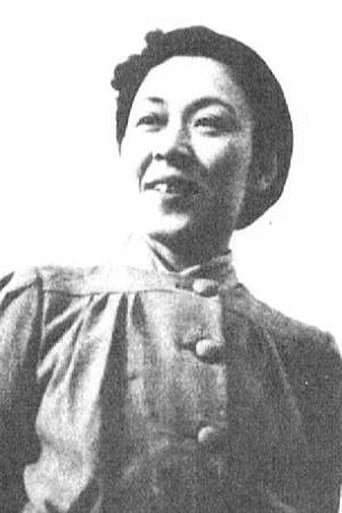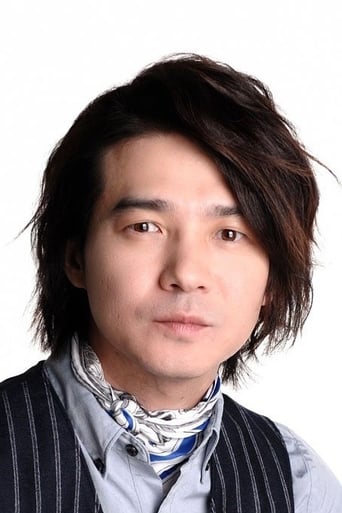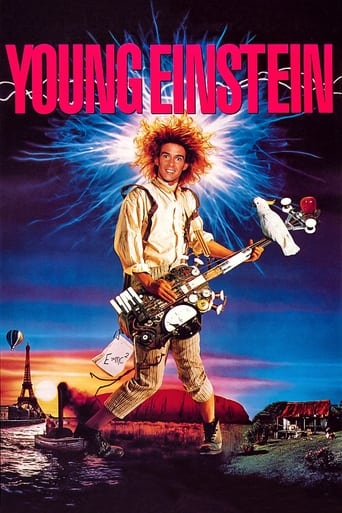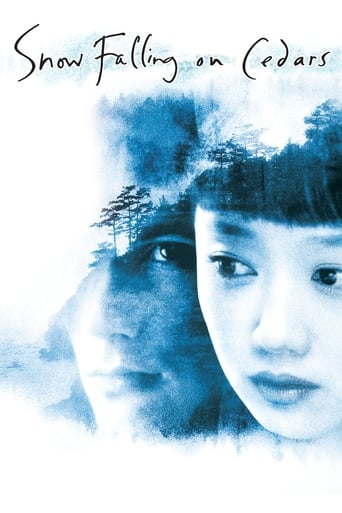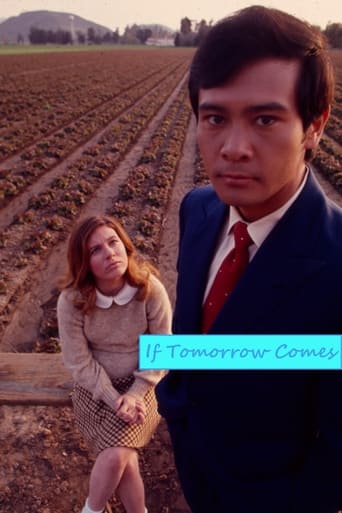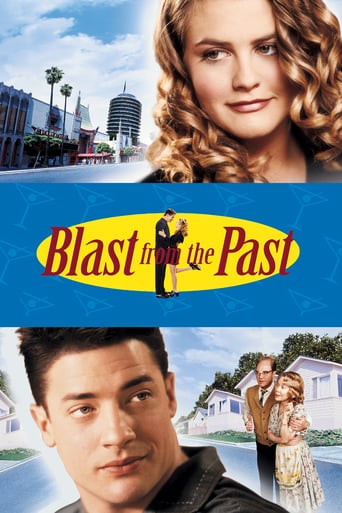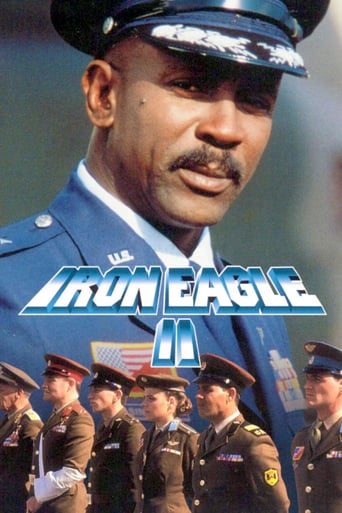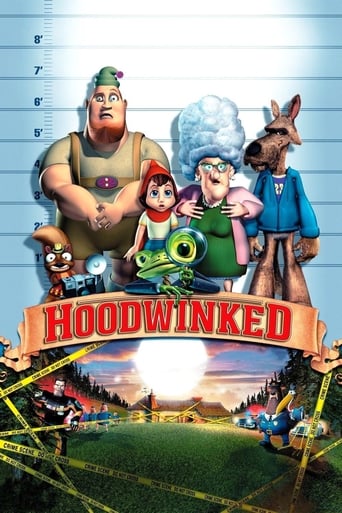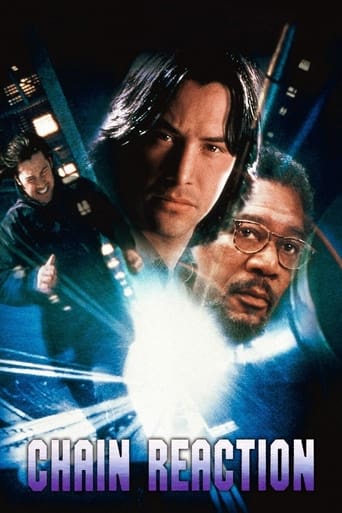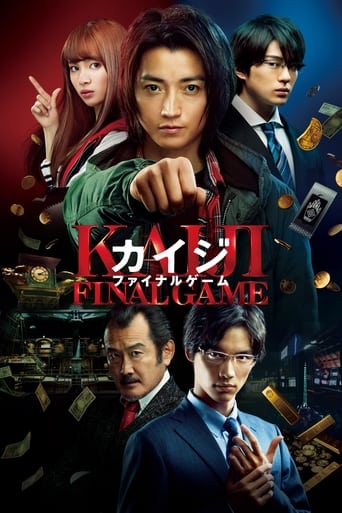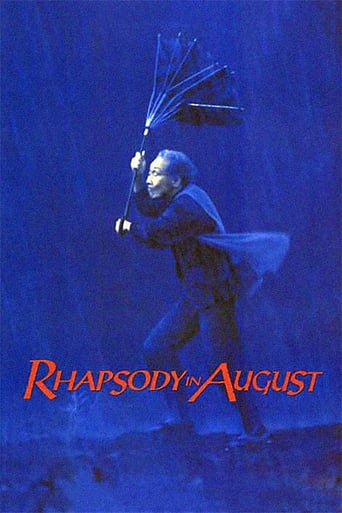
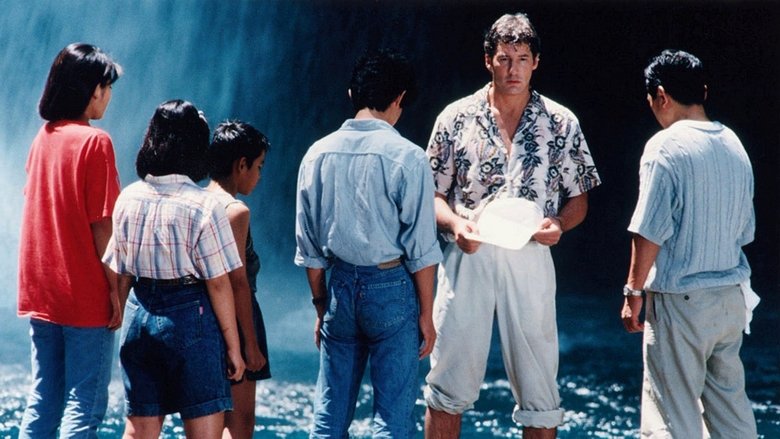
Rhapsody in August (1991)
The story centers on an elderly hibakusha, whose husband was one of 80,000 human beings killed in the 1945 atomic bombing of Nagasaki, caring for her four grandchildren over the summer. She learns of a long-lost brother, Suzujiro, living in Hawaii who wants her to visit him before he dies.
Watch Trailer
Cast


Similar titles
Reviews
Truly Dreadful Film
Load of rubbish!!
An absolute waste of money
An old-fashioned movie made with new-fashioned finesse.
Rhapsody in August is a very small movie. It has little of Kurosawa's bravura cinematic flare and could well, from its look, have been made for television. Yet there is something rather lovely about this little thing.The movie is about children staying with their grandmother who learn that she has a brother living in America. She doesn't remember this brother, one of many siblings, some dead, and the children, eager for a trip to California, try and encourage her to remember.The grandma is lovely. The children seemed a bit unconvincing, speaking in stiff conversations and sometimes over-emoting, but maybe that's what children are like in Japan.The grandma lives near Nagasaki, where she lost her husband, and the children do some downbeat sightseeing.When I read user reviews of this movie, several were mainly just a description of the story, and I seem to be doing the same thing. I'm not sure what it is about this movie that makes one want to tell what happens, since really, not much does. It's an episodic film that is notable not for story but for lovely, quiet moments like the survivors of a school carefully tending the twisted jungle gym left as a memorial.Perhaps one wants to tell the story because the movie is made up of little moments, like a search for a mysterious tree or ants crawling to a rose, that don't on their own seem to mean much and yet in the context of the film are striking.There is something wandering about the movie, although since life does wander this may be a feature rather than a bug. Like the reviewers here, I don't know what to make of the final, overlong scene, and I would have preferred something else. But I am glad I saw this.
Akira Kurosawa is a director with a big heart, who tackles significant human problems at all levels (socio-political, economic, social or psychological). His films are always focused on individual human beings with their love of life, their courage, magnanimity or sexuality, but also with their violence, vices, credulity or thirst for power. His movies illustrate in a sublime manner the harsh battle for survival of ordinary people against the forces of evil (politicians, generals, robbers or other wicked people). They shine through their sincerity, their overwhelming emotions and Kurosawa's brilliant directing (cast as well as camera) with scenes and images that take the viewer by the throat.This movie is a perfect example of Kurosawa's true craftsmanship. Its theme is nothing less than the effect of the atomic bomb dropped on Nagasaki. Its effect is that 'angels weep'. They weep because those who are responsible for the launch of the bomb argued that the 'Lightning' was necessary to end the war. But the 'Lightning' continues to kill. It still causes mighty suffering for innocent people and that for the rest of their lives. Moreover, those who launched the atomic bomb do not like to remember it. They prefer to forget all the victims, also those who survived the 'Lightning'.At the heart of this movie stands a grandmother who lost most of her family in the disaster, except, among other people, a brother who emigrated to the US. She wants to see him before she dies. In the meantime, her four grandchildren as well as an American nephew (played by Richard Gere) pay a visit to her. But, the memory of the disaster continues to haunt her. When a violent thunderstorm erupts over her village, she believes that a new bomb has fallen on the city of Nagasaki. She runs desperately to the rescue of the 'new victims'. With a courageous Richard Gere in an amazing role, this movie is a must for all movie lovers and for all fans of Akira Kurosawa.
On August 9, 1945, six years into the bloodiest war concocted by governments of major powers, the humble Japanese people -that had nothing to do with the decisions of their barbarous rulers- he got up after another night marked by anxiety and terror. For the past six months, dozens of cities were being bombed by allied forces prepared to uproot every trace of fascism. And just three days before the most terrible bomb that has come to know humanity, had been released by the U.S. against the people of Hiroshima, killing 180,000 people with it, most of them, innocent civilians. Around noon, a beautiful and loving lady, look forward to her husband who, at that time, was in the city of Nagasaki. When the clock struck at the stroke of 11:00 am, she was out of the house looking at the mountains that separated the place where he was the father of her children. Two seconds later, heard, this time very close, another terrifying explosion as three days before, he did believe that had opened wide the gates of hell. A huge mushroom of fire and smoke curled over the mountains in the center of Nagasaki and an satanic eye kept on your retina the image of all those around him. About 80 thousand civilians, without any role in the conflict, were killed instantly and in the course of the year. It was Harry S. Truman' gift, to account for the "power" of the American nation. 46 years after of this insucess, the director Akira Kurosawa tried to do an act of reflection, forgiveness and reconciliation, hatred against any lag still persists in the minds of people. And a grandmother, the woman who was waiting for the husband who never returned and never was able to identify among charred corpses, feels that he has erased any resentment in his heart, but still thinks with pain in man she loved. Four grandchildren accompany now and the memories will come to your mind as a choice between a trip to Hawaii is put on the table.For unlucky, this is a timid film of little relevance and visual plot, and that does not achieve sufficient strength and sensitivity that we had used the master Kurosawa. The presence of Richard Gere gives very little, and the film dissolves without the emotional impact that we hoped we would.
RHAPSODY IN AUGUST is not an anti-American film. Although some of the characters express anti-American sentiments, the film rejects them. And Richard Gere's character does not apologize for the atomic bombing (which would have been unforgivably presumptuous of Kurosawa). He apologizes for his family's ignorance of the fate of his uncle.But that's not to say that this is a good film. Kurosawa hectors the audience, which is a thing he hardly ever does. And surely Kurosawa could have found a more interesting American actor than Richard Gere to play Clark. And it is true that Kurosawa, while eschewing an anti-American stance, does try to pin the blame on "war," meaning that he tries to parcel the blame out equally. But of course, the blame for WWII isn't shared equally. Perhaps having Clark mention that his mother's brother died at Pearl Harbor, or making his wife a Chinese-American whose parents were murdered at Nanking, might have served as a prophylactic against this moral failing. Of course, this might have meant that Kurosawa would have had to come to terms with his own past as a wartime propagandist for the government which committed those crimes.Perhaps the silliest aspect of the film is its indignant insistence that Americans don't want to discuss the bombings.Please. We discuss it all the time. We debate, and we agonize, and we yammer endlessly about what might have happened, and what did Truman think might have happened, and what if this and what if that. We also talk about the firebombings of Tokyo and Dresden, the sellout to Stalin at Yalta, and all the other things we did which are at least morally questionable if not criminal.And to have this point of view put forth in a film which studiously avoids mention of Pearl Harbor, Nanking, the Philippines, Bataan, the atrocities in the POW camps, or any other undoubted crimes committed by the Japanese government is particularly galling.All in all, the poorest of the 22 Kurosawa films which I have seen. The only thing here to which I can give unqualified praise is the remarkable performance of Sachiko Murase as Kane.


